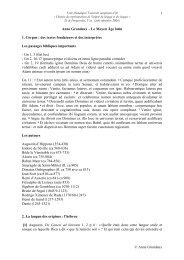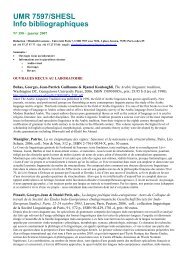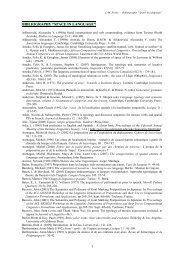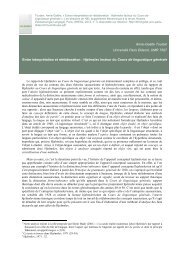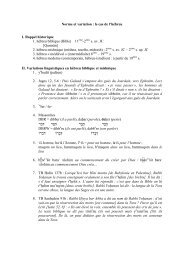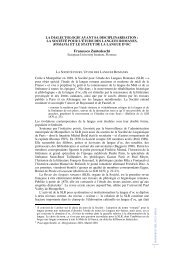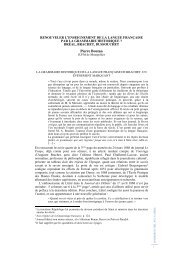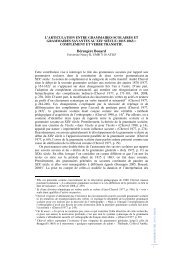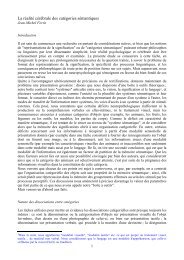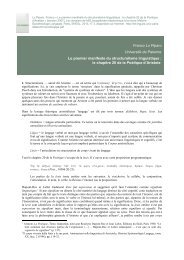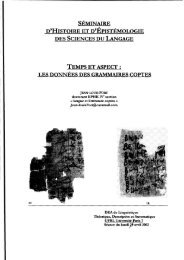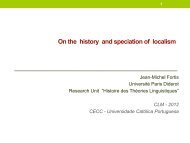1 on localism in the history of linguistics - Histoire des théories ...
1 on localism in the history of linguistics - Histoire des théories ...
1 on localism in the history of linguistics - Histoire des théories ...
You also want an ePaper? Increase the reach of your titles
YUMPU automatically turns print PDFs into web optimized ePapers that Google loves.
ON LOCALISM IN THE HISTORY OF LINGUISTICS<br />
1<br />
Workshop <strong>on</strong> <strong>localism</strong> – AFLiCo 2011 (25/5/2011)<br />
Jean-Michel Fortis, CNRS, UMR 7597 “<strong>Histoire</strong> <strong>des</strong> Théories L<strong>in</strong>guistiques”, Université Paris<br />
Diderot Paris 7.<br />
1. WHAT IS LOCALISM?<br />
Localism was def<strong>in</strong>ed by Ly<strong>on</strong>s as “<strong>the</strong> hypo<strong>the</strong>sis that spatial expressi<strong>on</strong>s are more basic,<br />
grammatically and semantically, than various k<strong>in</strong>ds <strong>of</strong> n<strong>on</strong> spatial expressi<strong>on</strong>s (…). Spatial<br />
expressi<strong>on</strong>s are l<strong>in</strong>guistically more basic, accord<strong>in</strong>g to <strong>the</strong> localists, <strong>in</strong> that <strong>the</strong>y serve as<br />
structural templates, as it were, for o<strong>the</strong>r expressi<strong>on</strong>s ; and <strong>the</strong> reas<strong>on</strong> why this should be so,<br />
it is plausibly suggested by psychologists, is that spatial organizati<strong>on</strong> is <strong>of</strong> central importance<br />
<strong>in</strong> human cogniti<strong>on</strong>” (1977: 718).<br />
Localism, <strong>the</strong>refore, is <strong>the</strong> view that <strong>the</strong> c<strong>on</strong>ceptualizati<strong>on</strong> <strong>of</strong> spatial relati<strong>on</strong>s or moti<strong>on</strong><br />
events underlies (at least part <strong>of</strong>) grammatical structure. Grammatical structure refers esp. to<br />
dia<strong>the</strong>sis and transitivity, grammat. relati<strong>on</strong>s (subject / object), cases. Localism may also<br />
extend to lexical semantics, <strong>in</strong> which case spatial relati<strong>on</strong>s are c<strong>on</strong>sidered to be <strong>of</strong> central<br />
importance <strong>in</strong> analyz<strong>in</strong>g <strong>the</strong> mean<strong>in</strong>g <strong>of</strong> a lexical item.<br />
2. WHEN DID LOCALISM APPEAR?<br />
In <strong>the</strong> field <strong>of</strong> case <strong>the</strong>ory, <strong>the</strong> traditi<strong>on</strong>al view is that localist ideas are first attested <strong>in</strong><br />
treatises <strong>of</strong> Byzant<strong>in</strong>e grammarians, notably Maximus Planu<strong>des</strong> (c.1260-c.1305). This view<br />
can be found <strong>in</strong> Curtius 1864, who apparently holds it from a slightly earlier and unknown<br />
source; it is repeated <strong>in</strong> Ste<strong>in</strong>thalʼs Geschichte der Sprachwissenschaft, 2 nd ed. <strong>of</strong> 1891 and<br />
Hjelmslev 1935, who refers back to Ste<strong>in</strong>thal. Chanet (1985) argues c<strong>on</strong>v<strong>in</strong>c<strong>in</strong>gly that this<br />
<strong>in</strong>terpretati<strong>on</strong> <strong>of</strong> Planu<strong>des</strong> is doubtful.<br />
Bey<strong>on</strong>d <strong>the</strong> questi<strong>on</strong> <strong>of</strong> cases, modist grammarians (13 th -14 th cent.) have defended localist<br />
(or better: physicalist) views <strong>on</strong> grammatical structure (grammatical structure mirrors moti<strong>on</strong><br />
events, for ex. <strong>the</strong> subject is <strong>des</strong>cribed as a pr<strong>in</strong>cipium motus; cf. Kelly 1977). Earlier still, <strong>the</strong><br />
noti<strong>on</strong> <strong>of</strong> transitivity has been sometimes analyzed <strong>in</strong> physicalist terms (for ex. ap.<br />
Appol<strong>on</strong>ius Dyscoles, 2 nd cent. AD, who c<strong>on</strong>sidered that can<strong>on</strong>ical transitivity <strong>in</strong>volves <strong>the</strong><br />
transfer <strong>of</strong> activity (energeia) from a pers<strong>on</strong> to ano<strong>the</strong>r; Colombat 2009).<br />
The rise <strong>of</strong> empiricism (esp. after Locke) 1 , which results <strong>in</strong> a new <strong>in</strong>terest <strong>in</strong> <strong>the</strong> relati<strong>on</strong> <strong>of</strong><br />
language to thought, br<strong>in</strong>gs to attenti<strong>on</strong> words which express c<strong>on</strong>necti<strong>on</strong>s between ideas,<br />
and which Locke calls “particles”. Leibniz was impressed by Lockeʼs observati<strong>on</strong>s <strong>on</strong><br />
particles (Nouveaux Essais III.7), and explicitly endorses localist ideas about <strong>the</strong> core<br />
mean<strong>in</strong>g <strong>of</strong> a class <strong>of</strong> particles, namely prepositi<strong>on</strong>s:<br />
Circa praepositi<strong>on</strong>es observandum videtur omnes <strong>in</strong> nostris l<strong>in</strong>guis usitatis orig<strong>in</strong>arie significare<br />
respectum ad situm, et <strong>in</strong>de transferri tropo quodam ad noti<strong>on</strong>es quasdam metaphysicas m<strong>in</strong>us<br />
imag<strong>in</strong>ati<strong>on</strong>i subjectas. Quod mirum n<strong>on</strong> est, quia hom<strong>in</strong>es etiam ea quae imag<strong>in</strong>ari n<strong>on</strong> possunt<br />
per res imag<strong>in</strong>ati<strong>on</strong>i subjectas explicare c<strong>on</strong>antur (Leibniz, Analysis Particularum, 1685-6 : 647). 2<br />
1 Of course, empiricism was not born with Locke. Its orig<strong>in</strong> can be traced back to Aristotle (cf. De Anima 432a5s).<br />
The presence <strong>of</strong> <strong>the</strong> famous motto nihil est <strong>in</strong>tellectu quod n<strong>on</strong> prius fuerit <strong>in</strong> sensu <strong>in</strong> authors like Thomas<br />
Aqu<strong>in</strong>as, Gassendi and Locke (Cranefield 1970) shows that it had rema<strong>in</strong>ed <strong>on</strong> <strong>the</strong> philosophical horiz<strong>on</strong>.<br />
2 The idea that “spiritual th<strong>in</strong>gs” or abstract noti<strong>on</strong>s are known and <strong>des</strong>ignated by words denot<strong>in</strong>g “bodily th<strong>in</strong>gs”,<br />
for ex. through metaphors, is wi<strong>des</strong>pread <strong>in</strong> <strong>the</strong> 17 th century, that is, before Locke. Thus, nei<strong>the</strong>r Locke nor a<br />
fortiori Leibniz are <strong>the</strong> first authors who associate a cognitive <strong>the</strong>ory <strong>of</strong> metaphor with a semantic analysis <strong>of</strong>
2<br />
Workshop <strong>on</strong> <strong>localism</strong> – AFLiCo 2011 (25/5/2011)<br />
Harris, <strong>in</strong> his Hermes (1765), draws a parallel between prepositi<strong>on</strong>s and cases, c<strong>on</strong>siders<br />
that <strong>the</strong> primary mean<strong>in</strong>g <strong>of</strong> prepositi<strong>on</strong>s is spatial, and analyzes <strong>the</strong> genitive and dative<br />
cases <strong>in</strong> localist terms (resp. as spatial from- and to-cases ; 1765: 284s). Like Harris,<br />
C<strong>on</strong>dillac (1765, vol. II, chap. 13) claims that <strong>the</strong> primary mean<strong>in</strong>g <strong>of</strong> prep. is spatial.<br />
But <strong>the</strong> glory days <strong>of</strong> localist case <strong>the</strong>ories beg<strong>in</strong> around 1815-1830 <strong>in</strong> Germany. One <strong>of</strong> <strong>the</strong><br />
<strong>in</strong>itiators <strong>of</strong> this trend might be Doeleke 1814 (also spelled Döleke or Dölecke), who refers to<br />
Harris. O<strong>the</strong>r localist studies will follow suit. Supporters <strong>of</strong> <strong>localism</strong>, radical or less so, and<br />
<strong>the</strong>ir opp<strong>on</strong>ents will engage <strong>in</strong> a c<strong>on</strong>troversy that will last a good 80 years. German 19 th<br />
century is <strong>the</strong>refore a very important period <strong>in</strong> <strong>the</strong> <strong>history</strong> <strong>of</strong> <strong>localism</strong>. Hjelmslev (1935) is still<br />
<strong>the</strong> most thorough survey to date.<br />
I will now turn to <strong>the</strong> German doma<strong>in</strong>, and move <strong>on</strong> next to localist ideas <strong>in</strong> c<strong>on</strong>temporary<br />
l<strong>in</strong>guistics. F<strong>in</strong>ally, I will ask whe<strong>the</strong>r a c<strong>on</strong>necti<strong>on</strong> or a comm<strong>on</strong> ground unites <strong>the</strong>se two<br />
periods.<br />
3. XIX TH CENTURY GERMAN LOCALISM: ITS BACKGROUND<br />
3.1. C<strong>on</strong>text <strong>in</strong> l<strong>in</strong>guistics<br />
Several factors c<strong>on</strong>tribute to <strong>the</strong> emergence <strong>of</strong> comparative work <strong>on</strong> case:<br />
• Multiplicati<strong>on</strong> <strong>of</strong> school and higher-level grammars <strong>of</strong> Lat<strong>in</strong> and Greek, with c<strong>on</strong>ceptual<br />
presentati<strong>on</strong>s <strong>of</strong> cases (two problems: f<strong>in</strong>d logic <strong>in</strong> <strong>the</strong> various uses <strong>of</strong> a case, esp. <strong>the</strong><br />
genitive and dative, and expla<strong>in</strong> discrepancies between Lat<strong>in</strong> and Greek).<br />
• Discussi<strong>on</strong>s <strong>on</strong> <strong>the</strong> typology <strong>of</strong> languages <strong>in</strong>herited from French Grammaire Générale<br />
(cf. <strong>the</strong> dist<strong>in</strong>cti<strong>on</strong> between langues analogues / transpositives, which prompted reflecti<strong>on</strong>s<br />
<strong>on</strong> <strong>the</strong> role <strong>of</strong> <strong>in</strong>flexi<strong>on</strong>s <strong>in</strong> langues transpositives).<br />
• Grow<strong>in</strong>g emphasis <strong>on</strong> <strong>the</strong> cross-l<strong>in</strong>guistic comparis<strong>on</strong> <strong>of</strong> grammatical forms (esp.<br />
<strong>in</strong>flexi<strong>on</strong>s).<br />
• Discovery <strong>of</strong> Sanskrit, a richly <strong>in</strong>flected language and rise <strong>of</strong> comparative studies which<br />
ensues (esp. Bopp).<br />
3.2. C<strong>on</strong>text <strong>in</strong> epistemology<br />
At this juncture (end <strong>of</strong> 18 th and beg<strong>in</strong>nig <strong>of</strong> 19 th cent.), German <strong>the</strong>ories <strong>of</strong> knowledge are<br />
under <strong>the</strong> <strong>in</strong>fluence <strong>of</strong> several major trends:<br />
• Empiricist views (with occasi<strong>on</strong>al rants aga<strong>in</strong>st overly “logical” views <strong>of</strong> general<br />
grammar), i.e. th<strong>in</strong>k<strong>in</strong>g proceeds from c<strong>on</strong>crete experience to abstract noti<strong>on</strong>s, some <strong>of</strong><br />
<strong>the</strong> latter hav<strong>in</strong>g an element <strong>of</strong> abitrar<strong>in</strong>ess (Lockeʼs mixed mo<strong>des</strong> for ex. 3 ) reflected <strong>in</strong><br />
language (hence <strong>the</strong> importance <strong>of</strong> language as a w<strong>in</strong>dow <strong>on</strong> thought).<br />
• In Germany, importance <strong>of</strong> Kantʼs ideas, esp. Anschauung ʻ<strong>in</strong>tuiti<strong>on</strong>ʼ as mediat<strong>in</strong>g <strong>the</strong><br />
understand<strong>in</strong>g <strong>of</strong> c<strong>on</strong>cepts through experience :<br />
“It is, <strong>the</strong>refore, just as necessary to make <strong>the</strong> m<strong>in</strong>d's c<strong>on</strong>cepts sensible — that is, to add<br />
an object to <strong>the</strong>m <strong>in</strong> <strong>in</strong>tuiti<strong>on</strong> — as to make our <strong>in</strong>tuiti<strong>on</strong>s understandable — that is, to<br />
br<strong>in</strong>g <strong>the</strong>m under c<strong>on</strong>cepts. These two powers [Verstand ʻunderstand<strong>in</strong>gʼ and Anschauung<br />
ʻ<strong>in</strong>tuiti<strong>on</strong>ʼ], or capacities, cannot exchange <strong>the</strong>ir functi<strong>on</strong>s. The understand<strong>in</strong>g can <strong>in</strong>tuit<br />
l<strong>in</strong>guistic forms. The same view is advocated by Clauberg and Lamy (Formigari 1988a: 112sqq). Clauberg is<br />
identified by Aarsleff as a possible source <strong>of</strong> Locke (Aarsleff 1982: 66-7).<br />
3 Mixed mo<strong>des</strong> are composed by men from simple ideas (Essay ch. XXII). Examples are obligati<strong>on</strong>, lie,<br />
sacrilege… The dist<strong>in</strong>cti<strong>on</strong> between real and nom<strong>in</strong>al essence also underl<strong>in</strong>es <strong>the</strong> relevance <strong>of</strong> language for<br />
understand<strong>in</strong>g our c<strong>on</strong>cepts, and <strong>the</strong> distance that may separate nom<strong>in</strong>al def<strong>in</strong>iti<strong>on</strong>s from <strong>the</strong> real c<strong>on</strong>stituti<strong>on</strong> <strong>of</strong><br />
th<strong>in</strong>gs.
3<br />
Workshop <strong>on</strong> <strong>localism</strong> – AFLiCo 2011 (25/5/2011)<br />
noth<strong>in</strong>g, <strong>the</strong> senses can th<strong>in</strong>k noth<strong>in</strong>g. Only from <strong>the</strong>ir unificati<strong>on</strong> can cogniti<strong>on</strong> arise.”<br />
(Kant, CPR, A50-51/B74-76)<br />
Kant did exert an <strong>in</strong>fluence <strong>on</strong> German <strong>in</strong>guistics (Kantʼs system was <strong>the</strong> newest th<strong>in</strong>g <strong>in</strong><br />
“logic”, and <strong>the</strong> relati<strong>on</strong> <strong>of</strong> “logical judgment” to forms was an important c<strong>on</strong>cern). We shall<br />
see that some basic Kantian noti<strong>on</strong>s seem to be taken for granted by some l<strong>in</strong>guists, esp.<br />
Wüllner (Parret 1989).<br />
• F<strong>in</strong>ally, language itself is sometimes c<strong>on</strong>ceived <strong>of</strong> as <strong>the</strong> repository <strong>of</strong> <strong>the</strong> c<strong>on</strong>diti<strong>on</strong>s <strong>of</strong><br />
thought (a sort <strong>of</strong> l<strong>in</strong>guistic twist<strong>in</strong>g <strong>of</strong> Kantian philosophy), with an <strong>in</strong>sistence <strong>on</strong> human<br />
sp<strong>on</strong>taneity and freedom <strong>in</strong> <strong>the</strong> creati<strong>on</strong> <strong>of</strong> l<strong>in</strong>guistic forms. W. v. Humboldt exemplifies<br />
this shift. “Humboldtʼs philosophy <strong>of</strong> language could be summarized by say<strong>in</strong>g that he<br />
carries <strong>the</strong> noti<strong>on</strong> <strong>of</strong> transcendantal from thought to language” (Formigari 1988b: 63). 4<br />
C<strong>on</strong>sequence <strong>on</strong> <strong>the</strong> research agenda<br />
The comparative study <strong>of</strong> grammatical forms is associated with <strong>the</strong> view that th<strong>in</strong>k<strong>in</strong>g is<br />
c<strong>on</strong>diti<strong>on</strong>ed by language, and <strong>the</strong> empiricist (and post-kantian) view that thought proceeds<br />
from c<strong>on</strong>crete to abstract, or is shaped by <strong>in</strong>tuiti<strong>on</strong> and categories <strong>of</strong> experience.<br />
4. LOCALISM<br />
The first two extensive localist case <strong>the</strong>ories are due to Wüllner and Hartung, who worked<br />
<strong>in</strong>dependently from each o<strong>the</strong>r. Wüllner <strong>of</strong>fers a particularly <strong>in</strong>terest<strong>in</strong>g illustrati<strong>on</strong>.<br />
4.1. An example: Wüllnerʼs <strong>the</strong>ory<br />
Wüllnerʼs analysis essentially bears <strong>on</strong> Lat<strong>in</strong> and Greek (1827) and later <strong>on</strong> Sanskrit as well<br />
(1831), with frequent references to German, and occasi<strong>on</strong>al menti<strong>on</strong>s <strong>of</strong> English, Italian,<br />
French, Modern Greek, Hebrew. Wüllner was Boppʼs student, and etymological research <strong>on</strong><br />
Indo-european roots is <strong>the</strong>refore an important aspect <strong>of</strong> his work.<br />
Accord<strong>in</strong>g to Wüllner, <strong>the</strong> basic mean<strong>in</strong>gs (Grundbedeutungen) <strong>of</strong> <strong>the</strong> genitive, accusative<br />
and dative cases are spatial <strong>in</strong>tuiti<strong>on</strong>s (Anschauungen), resp. <strong>of</strong> a start<strong>in</strong>g po<strong>in</strong>t (woher<br />
ʻwhere fromʼ), <strong>of</strong> a goal (woh<strong>in</strong> ʻwhere toʼ) and a localizati<strong>on</strong> (wo ʻwhereʼ). Intuiti<strong>on</strong>s reflect <strong>the</strong><br />
subjective (vs objective) nature <strong>of</strong> language, and <strong>the</strong> fact that <strong>the</strong> c<strong>on</strong>cepti<strong>on</strong> <strong>of</strong> abstract<br />
relati<strong>on</strong>s is always rooted <strong>in</strong> sensuous experience.<br />
The various accepti<strong>on</strong>s <strong>of</strong> a case are derived from <strong>the</strong> basic mean<strong>in</strong>g, just like <strong>in</strong> a radiat<strong>in</strong>g<br />
network. By way <strong>of</strong> illustrati<strong>on</strong>, <strong>the</strong> follow<strong>in</strong>g network sums up <strong>the</strong> various uses <strong>of</strong> <strong>the</strong> genitive<br />
case and <strong>the</strong>ir c<strong>on</strong>necti<strong>on</strong>s <strong>in</strong> Wüllnerʼs account (<strong>the</strong> labels are my own, <strong>the</strong> examples are<br />
taken from Wüllner, <strong>the</strong> translati<strong>on</strong>s are literal):<br />
4 I note <strong>in</strong> pass<strong>in</strong>g that W. v. Humboldt also holds localist views <strong>in</strong> his (1830) Die Verwandtschaft der<br />
Ortsadverbien mit dem Pr<strong>on</strong>omen <strong>in</strong> e<strong>in</strong>igen Sprachen (pr<strong>on</strong>ouns are derived from locative adverbs: spatial<br />
<strong>in</strong>tuiti<strong>on</strong> mediates <strong>the</strong> c<strong>on</strong>cepti<strong>on</strong> underly<strong>in</strong>g forms which, like pr<strong>on</strong>ouns, abstract away from qualitative<br />
determ<strong>in</strong>ati<strong>on</strong>s). Humboldtʼs data do not come from <strong>the</strong> usual classical languages, but from Armenian, Ch<strong>in</strong>ese,<br />
T<strong>on</strong>gian, Maori and Japanese.
prehensive,<br />
utilitative<br />
(ónasthai t<strong>in</strong>os<br />
ʻuse sthGENʼ)<br />
FROM<br />
(Woher)<br />
receptive<br />
(lágkhane<strong>in</strong><br />
t<strong>in</strong>os ʻobta<strong>in</strong><br />
sthGENʼ)<br />
cognitive ,<br />
perceptive<br />
(akoúe<strong>in</strong> t<strong>in</strong>os<br />
ʻhear sthGENʼ)<br />
<strong>des</strong>iderative<br />
(epithúme<strong>in</strong> t<strong>in</strong>os<br />
ʻ<strong>des</strong>ire sthGENʼ)<br />
standpo<strong>in</strong>t (belli<br />
peritus ʻexperienced<br />
<strong>of</strong> warʼ)<br />
time (orig<strong>in</strong> and durati<strong>on</strong>)<br />
(khrónou sukhnoû ʻfrom a<br />
l<strong>on</strong>g timeʼ)<br />
4<br />
Workshop <strong>on</strong> <strong>localism</strong> – AFLiCo 2011 (25/5/2011)<br />
lack / abundance<br />
(carere alicuius<br />
ʻlack sthGENʼ)<br />
substance<br />
(di seta ʻ<strong>of</strong> silkʼ)<br />
possessive (improbi<br />
hom<strong>in</strong>is est mendacio<br />
fallere ʻdeceiv<strong>in</strong>g by<br />
lie is <strong>of</strong> a dish<strong>on</strong>est<br />
manʼ)<br />
causative (múrou<br />
pneîn ʻsmell <strong>of</strong><br />
unguentʼ)<br />
comparative (sophôteros<br />
Alkibiádou ʻwiser from<br />
Alcibia<strong>des</strong>ʼ)<br />
spat./temp.<br />
standpo<strong>in</strong>t (pro<br />
teikheôn ʻ<strong>in</strong> fr<strong>on</strong>t<br />
from <strong>the</strong> wallsʼ)<br />
quality / value<br />
(vir magnæ<br />
sapientiæ ʻman <strong>of</strong><br />
great wisdomʼ)<br />
pretiative<br />
(ôneisthai muriôn<br />
drakhmôn ʻto buy <strong>of</strong><br />
thousands drachmasʼ)<br />
<strong>in</strong>terjective<br />
(oímoi tôn kakôn<br />
ʻwoeʼs me from bad<br />
luckʼ)<br />
Wüllner cites as evidence for his account <strong>the</strong> fact that cases can be substituted with or<br />
fur<strong>the</strong>r determ<strong>in</strong>ed by prepositi<strong>on</strong>s which clearly have a basic spatial mean<strong>in</strong>g; fur<strong>the</strong>r, <strong>the</strong><br />
verbs (or adj., or nouns) used with a particular case fit <strong>in</strong>to <strong>the</strong> same basic spatial<br />
c<strong>on</strong>ceptualizati<strong>on</strong> as <strong>the</strong> <strong>on</strong>e supposed to underlie <strong>the</strong> case itself.<br />
Nom<strong>in</strong>ative and vocative are left out <strong>of</strong> <strong>the</strong> picture (<strong>the</strong>y are not real cases, be<strong>in</strong>g used for<br />
objects c<strong>on</strong>ceptualized as <strong>in</strong>dependent). The ablative was orig<strong>in</strong>ally identical with <strong>the</strong> dative,<br />
and <strong>the</strong> <strong>in</strong>strumental / locative uses <strong>of</strong> this dative-ablative can be derived from its basic<br />
spatial mean<strong>in</strong>g.<br />
4.2. Diachr<strong>on</strong>y<br />
The sec<strong>on</strong>d major opus <strong>of</strong> Wüllner (1831) is an exercise <strong>in</strong> comparative grammar, rife with<br />
data from Sanskrit, <strong>in</strong> additi<strong>on</strong> to Lat<strong>in</strong> and Greek (Sanskrit is nearly absent from his 1827<br />
book). In this study, Wüllner pr<strong>of</strong>esses an extreme k<strong>in</strong>d <strong>of</strong> <strong>localism</strong>: “Our m<strong>in</strong>d embodies<br />
[verkörpert] everyth<strong>in</strong>g to which it c<strong>on</strong>fers existence, and, by <strong>the</strong> same move, th<strong>in</strong>ks this<br />
existent as exist<strong>in</strong>g <strong>in</strong> space” (1831: 272).<br />
Wüllner (1831) tries to show that forms express<strong>in</strong>g moti<strong>on</strong>, deixis and spatial relati<strong>on</strong>s are <strong>the</strong><br />
major source <strong>of</strong> lexicalizati<strong>on</strong> <strong>of</strong> all l<strong>in</strong>guistic forms. Boppʼs <strong>in</strong>fluence is perceptible. Indeed,<br />
Bopp had shown that some end<strong>in</strong>gs <strong>of</strong> Sanskrit, Lat<strong>in</strong> and Greek declensi<strong>on</strong>s came from<br />
dem<strong>on</strong>stratives or prepositi<strong>on</strong>s with an “orig<strong>in</strong>ally” spatial mean<strong>in</strong>g, and that at least some
5<br />
Workshop <strong>on</strong> <strong>localism</strong> – AFLiCo 2011 (25/5/2011)<br />
prepositi<strong>on</strong>s were closely related to dem<strong>on</strong>stratives (Bopp 1826). There is no doubt that<br />
Bopp enterta<strong>in</strong>ed localist ideas, and envisaged <strong>the</strong> development <strong>of</strong> language as <strong>the</strong><br />
lexicalizati<strong>on</strong> / grammaticalizati<strong>on</strong> <strong>of</strong> forms orig<strong>in</strong>ally related to sensuous and spatial<br />
experience. 5<br />
Accord<strong>in</strong>g to Wüllner roots <strong>of</strong> “orig<strong>in</strong>al” (ursprüngliche) moti<strong>on</strong> verbs can be found <strong>in</strong> a<br />
number <strong>of</strong> verbs and verbal suffixes. An example is his analysis <strong>of</strong> <strong>in</strong>choative verbs like Lat<strong>in</strong><br />
matur-es-c-o = ʻripe-to.be-go-1Pʼ, where es- is found <strong>in</strong> Lat<strong>in</strong> esse, and c- is ak<strong>in</strong> to a<br />
Sanskrit form gâ, also found <strong>in</strong> Eng. go and Germ. gehen (Wüllner 1831 : 72).<br />
Pr<strong>on</strong>ouns, some case forms and verbal end<strong>in</strong>gs, some adverbs are derived from <strong>the</strong> three<br />
“most orig<strong>in</strong>al” (ursprünglichste) dem<strong>on</strong>strative adverbs i / a / u (resp. proximal / distal /<br />
proximal and below, hidden from view).<br />
Substantives and adjectives are hypo<strong>the</strong>sized to have pr<strong>on</strong>om<strong>in</strong>al (and ultimately,<br />
dem<strong>on</strong>strative) end<strong>in</strong>gs, <strong>on</strong> <strong>the</strong> ground that pr<strong>on</strong>ouns serve to anchor a referent <strong>in</strong> space<br />
(1831: 272-3). For ex. Lat<strong>in</strong> frag-i-li-s is analyzed as a substantificati<strong>on</strong> <strong>of</strong> <strong>the</strong> break<strong>in</strong>g acti<strong>on</strong>,<br />
with locativizati<strong>on</strong> by -i-, and pr<strong>on</strong>om<strong>in</strong>alizati<strong>on</strong> by -li-, with <strong>the</strong> result<strong>in</strong>g mean<strong>in</strong>g ʻbreak<strong>in</strong>g<strong>in</strong>-<strong>the</strong><br />
<strong>on</strong>eʼ or ʻ<strong>the</strong> <strong>on</strong>e <strong>in</strong>volved <strong>in</strong> a break<strong>in</strong>g acti<strong>on</strong>ʼ (1831 : 318).<br />
4.3. Hjelmslev (1935-7)<br />
A hundred years after its formulati<strong>on</strong>, Hjelmslev still regards Wüllnerʼs <strong>the</strong>ory as <strong>the</strong> best<br />
account <strong>of</strong> cases. The reas<strong>on</strong>s why Hjelmslev si<strong>des</strong> with <strong>the</strong> localists have been exposed <strong>in</strong><br />
Parret (1995), and limitati<strong>on</strong>s <strong>of</strong> space prevent me from go<strong>in</strong>g <strong>in</strong>to <strong>the</strong> details <strong>of</strong> Hjelmslevʼs<br />
<strong>the</strong>ory.<br />
Hjelmslev rema<strong>in</strong>s faithful to <strong>the</strong> localist idea that directi<strong>on</strong> is a basic dimensi<strong>on</strong> <strong>of</strong> case<br />
systems, but he takes directi<strong>on</strong> <strong>in</strong> a very abstract sense which subsumes <strong>the</strong> various<br />
accepti<strong>on</strong>s that Wüllner derives from each basic mean<strong>in</strong>g (<strong>in</strong> this, I th<strong>in</strong>k he distorts Wüllnerʼs<br />
ideas). Fur<strong>the</strong>r, Hjelmslev po<strong>in</strong>ts out that case systems cannot be reduced to <strong>the</strong> dimensi<strong>on</strong><br />
<strong>of</strong> directi<strong>on</strong>. More complex systems than <strong>the</strong> <strong>on</strong>es found <strong>in</strong> Indoeuropean languages show<br />
that more than directi<strong>on</strong> is <strong>in</strong>volved. In fact, <strong>the</strong> simplicity <strong>of</strong> Indoeuropean systems is likely to<br />
c<strong>on</strong>ceal possible syncretisms. More complex systems would <strong>the</strong>refore be better suited to<br />
tell<strong>in</strong>g apart <strong>the</strong> semantic dimensi<strong>on</strong>s <strong>of</strong> case. Tak<strong>in</strong>g <strong>in</strong>to account more complex case<br />
systems leads Hjelmslev to dist<strong>in</strong>guish 3 dimensi<strong>on</strong>s <strong>of</strong> c<strong>on</strong>trast:<br />
The first dimensi<strong>on</strong> <strong>of</strong> c<strong>on</strong>trast is that <strong>of</strong> directi<strong>on</strong>, like <strong>in</strong> localist accounts. The sec<strong>on</strong>d<br />
dimensi<strong>on</strong> perta<strong>in</strong>s to <strong>the</strong> “<strong>in</strong>timacy” <strong>of</strong> <strong>the</strong> locative relati<strong>on</strong>ship (i.e. <strong>in</strong> vs <strong>on</strong>, <strong>on</strong> vs above),<br />
or, <strong>in</strong> Hjelmslevʼs words, to <strong>the</strong> coherence / <strong>in</strong>coherence <strong>of</strong> <strong>the</strong> relati<strong>on</strong> which associates two<br />
entities. F<strong>in</strong>ally, <strong>the</strong> third dimensi<strong>on</strong> <strong>in</strong>volves an oppositi<strong>on</strong> between subjectively c<strong>on</strong>strued<br />
relati<strong>on</strong>s and objective <strong>on</strong>es (depend<strong>in</strong>g <strong>on</strong> whe<strong>the</strong>r a situati<strong>on</strong> is c<strong>on</strong>ceptualized <strong>in</strong> a relative<br />
frame or not). 6<br />
5. HALF-HEARTED LOCALISTS AND LOCALISTOPHOBICS<br />
Though I cannot provide first-hand c<strong>on</strong>firmati<strong>on</strong> <strong>of</strong> this, repeated statements made by<br />
protag<strong>on</strong>ists like Holzweissig, Curtius or Rumpel po<strong>in</strong>t to <strong>the</strong> fact that <strong>localism</strong> had ga<strong>in</strong>ed<br />
wide acceptance, especially am<strong>on</strong>g teachers <strong>of</strong> classical languages.<br />
5 For ex. he says that “causality and <strong>in</strong>strumentality, because <strong>the</strong>y are not spatial, external nor sensuous, are<br />
necessarily c<strong>on</strong>ceptualized spatially <strong>in</strong> order to be expressed” (1826: 78). His justificati<strong>on</strong> for assign<strong>in</strong>g <strong>the</strong><br />
ablative to an early l<strong>in</strong>guistic stage is also very reveal<strong>in</strong>g: “if external, spatial relati<strong>on</strong>s are <strong>the</strong> first for which a<br />
language must f<strong>in</strong>d a <strong>des</strong>ignati<strong>on</strong>, it follows that <strong>the</strong> ablative, <strong>in</strong> <strong>the</strong> sense <strong>in</strong> which it is used <strong>in</strong> Sanskrit, can be<br />
justifiably regarded as <strong>on</strong>e <strong>of</strong> <strong>the</strong> ol<strong>des</strong>t and most natural cases” (Bopp 1826 : 87-8).<br />
6 I w<strong>on</strong>der whe<strong>the</strong>r Hjelmslev could have <strong>in</strong>fluenced Langacker <strong>on</strong> this po<strong>in</strong>t and suggested to him <strong>the</strong> term, if not<br />
<strong>the</strong> c<strong>on</strong>cept, <strong>of</strong> subjectivity.
6<br />
Workshop <strong>on</strong> <strong>localism</strong> – AFLiCo 2011 (25/5/2011)<br />
However, localist <strong>the</strong>ories were fac<strong>in</strong>g serious difficulties (Curtius 1864). They had noth<strong>in</strong>g to<br />
say about <strong>the</strong> nom<strong>in</strong>ative (and voc.) cases. Similarities between nom<strong>in</strong>ative and accusative<br />
forms was troublesome, s<strong>in</strong>ce nom<strong>in</strong>ative could not be regarded as a local case. Fur<strong>the</strong>r, if<br />
accusative had a spatial basic mean<strong>in</strong>g, why was it hardly ever replaced by a prepositi<strong>on</strong> <strong>in</strong><br />
modern languages? Also, <strong>the</strong> genitive could be seen to be str<strong>on</strong>gly associated with nom<strong>in</strong>al<br />
determ<strong>in</strong>ati<strong>on</strong>, and its spatial uses seemed to be marg<strong>in</strong>al at best.<br />
5.1. Half-hearted localists<br />
Semi-<strong>localism</strong> was a way out <strong>of</strong> <strong>the</strong>se difficulties. For ex., Holzweissig (1877) makes <strong>the</strong><br />
follow<strong>in</strong>g dist<strong>in</strong>cti<strong>on</strong>:<br />
Grammatical cases Local cases<br />
nom<strong>in</strong>ative dative<br />
vocative ablative<br />
accusative locative<br />
genitive <strong>in</strong>str.-sociat.<br />
Local cases result from <strong>the</strong> splitt<strong>in</strong>g <strong>of</strong> an adverbial case dur<strong>in</strong>g an early period <strong>of</strong> Comm<strong>on</strong><br />
Indogermanic. From “Comm<strong>on</strong> Indogermanic” to Sanskrit to Greek and Lat<strong>in</strong>, <strong>the</strong> values <strong>of</strong><br />
local cases get “reshuffled”:<br />
Lat<strong>in</strong> Greek Sanskrit Basic mean<strong>in</strong>g<br />
(Grundbedeutung)<br />
abl. separat. gen. abl. From-case<br />
(Wohercasus)<br />
abl. loci / temp. dat. loci / temp. loc. Where-case<br />
(Wocasus)<br />
abl. comit. / mod. / dat. comit. / mod. / <strong>in</strong>str.-sociat. With-case<br />
<strong>in</strong>str.<br />
<strong>in</strong>str.<br />
(Mitcasus)<br />
dat. dat. dat. To-case<br />
(Woh<strong>in</strong>casus)<br />
Diachr<strong>on</strong>ic alterati<strong>on</strong>s <strong>of</strong> forms and mean<strong>in</strong>gs solved fur<strong>the</strong>r problems. For ex., why is<br />
accusative overrid<strong>in</strong>g dative for <strong>the</strong> expressi<strong>on</strong> <strong>of</strong> goal? Holzweissig claims that dative (or<br />
ablative), after hav<strong>in</strong>g absorbed <strong>the</strong> locative case, came to be associated with stasis, while<br />
<strong>the</strong> mean<strong>in</strong>g <strong>of</strong> <strong>the</strong> accusative was extended to goals.<br />
Holzweissigʼs views are relatively close to Ahrens divisi<strong>on</strong> between “logical” and “topical<br />
cases”, and to Ste<strong>in</strong>thalʼs dist<strong>in</strong>cti<strong>on</strong> between “real cases”, and “expressi<strong>on</strong>s <strong>of</strong> spatial<br />
relati<strong>on</strong>s”, himself <strong>in</strong> l<strong>in</strong>e with Wundt (1912). The latter two, however, do not c<strong>on</strong>sider spatial<br />
cases as genu<strong>in</strong>e cases.<br />
5.2. Localistophobics<br />
Rumpel (1845, 1866) is <strong>on</strong>e <strong>of</strong> <strong>the</strong> most prom<strong>in</strong>ent adversaries <strong>of</strong> <strong>localism</strong>. His ma<strong>in</strong><br />
objecti<strong>on</strong>s are that<br />
(1) localists read c<strong>on</strong>textual and extra-l<strong>in</strong>guistic mean<strong>in</strong>g <strong>in</strong>to cases;<br />
(2) <strong>the</strong>ir def<strong>in</strong>iti<strong>on</strong>s are vague and may fit more than <strong>on</strong>e case;<br />
(3) c<strong>on</strong>versely, a basic mean<strong>in</strong>g may be represented <strong>in</strong> more than <strong>on</strong>e case;<br />
(4) <strong>the</strong>y simply ignore <strong>the</strong> most important “logical” fact <strong>of</strong> all languages, namely that language<br />
reflects thought, hence <strong>in</strong>herits from judgment <strong>the</strong> subject-predicate structure, which
7<br />
Workshop <strong>on</strong> <strong>localism</strong> – AFLiCo 2011 (25/5/2011)<br />
c<strong>on</strong>diti<strong>on</strong>s <strong>the</strong> nom<strong>in</strong>ative-verb structure.<br />
He <strong>in</strong>sists that <strong>the</strong> mean<strong>in</strong>gs <strong>of</strong> cases are much more abstract than what localists take <strong>the</strong>m<br />
to be. His def<strong>in</strong>iti<strong>on</strong>s are still c<strong>on</strong>ceptual, yet are merely a re<strong>des</strong>cripti<strong>on</strong> <strong>of</strong> formal relati<strong>on</strong>s.<br />
For ex. “<strong>the</strong> mean<strong>in</strong>g <strong>of</strong> <strong>the</strong> object accusative is to establish an immediate b<strong>on</strong>d between a<br />
substantive and a verb, that is, a b<strong>on</strong>d which requires no specific mediati<strong>on</strong> <strong>in</strong> thought”<br />
(1866: 16).<br />
Rumpel illustrates a grow<strong>in</strong>g emphasis <strong>on</strong> formal analysis <strong>of</strong> cases, an emphasis also found,<br />
for ex. <strong>in</strong> a neo-grammarian like Delbrück (accord<strong>in</strong>g to Serbat 1981).<br />
6. LOCALISM IN COGNITIVE LINGUISTICS<br />
6.1. Anders<strong>on</strong> (1971)<br />
Localist case <strong>the</strong>ory was revived <strong>in</strong> <strong>the</strong> 70s by Anders<strong>on</strong> (1971), who was well aware <strong>of</strong> <strong>the</strong><br />
<strong>history</strong> <strong>of</strong> <strong>localism</strong>. Anders<strong>on</strong>ʼs own <strong>the</strong>ory was however dist<strong>in</strong>ctly modern, s<strong>in</strong>ce it was a<br />
generative-like approach, and aimed at a grammar <strong>of</strong> greater simplicity by reduc<strong>in</strong>g <strong>the</strong><br />
number <strong>of</strong> “deep” cases. Its data essentially come from English.<br />
Initially, Anders<strong>on</strong> recognizes 4 cases: nom<strong>in</strong>ative, ergative, locative, ablative, but <strong>the</strong>se are<br />
“deep” cases and many structures are given a localist <strong>in</strong>terpretati<strong>on</strong>, for ex. some surface<br />
nom<strong>in</strong>atives are analyzed as deep locatives 7 ; he <strong>the</strong>n goes <strong>on</strong> to hypo<strong>the</strong>size that erg and<br />
nom might reduce to abl and loc.<br />
It is unclear whe<strong>the</strong>r Anders<strong>on</strong> did exert a significant <strong>in</strong>fluence <strong>on</strong> early cognitive l<strong>in</strong>guistics.<br />
Langacker wrote a review <strong>of</strong> Anders<strong>on</strong>ʼ Grammar <strong>of</strong> Case <strong>in</strong> which he says that his “basically<br />
sympa<strong>the</strong>tic” to <strong>the</strong> localist hypo<strong>the</strong>sis (Langacker 1973: 321); at <strong>the</strong> time, however,<br />
Langackerʼs own approach was generative semantics and focused <strong>on</strong> o<strong>the</strong>r matters (Fillmore<br />
is probably a more direct <strong>in</strong>fluence; Fortis 2010b).<br />
6.2. Gruber and Talmy<br />
In <strong>the</strong> U.S., <strong>the</strong> first modern localist <strong>the</strong>ory is due to Gruber (1965), but it does not seem to<br />
owe anyth<strong>in</strong>g to previous work (it c<strong>on</strong>ta<strong>in</strong>s no references). Its first focus is <strong>on</strong> patterns <strong>of</strong><br />
deleti<strong>on</strong> <strong>of</strong> PP and adverbs <strong>in</strong> <strong>the</strong> c<strong>on</strong>text <strong>of</strong> verbal heads (for ex. climb (up), or jump (over)),<br />
and its lexical rules attempt to capture <strong>the</strong> opti<strong>on</strong>ality / obligator<strong>in</strong>ess <strong>of</strong> deleti<strong>on</strong>s. Gruber<br />
notes that “positi<strong>on</strong>al” noti<strong>on</strong>s carry over to “identificati<strong>on</strong>al”, “possessi<strong>on</strong>al”, “classmembership”<br />
or communicati<strong>on</strong>al c<strong>on</strong>texts. The <strong>des</strong>criptive apparatus can thus be applied to<br />
verbs which are not related to moti<strong>on</strong> or space. For ex., <strong>the</strong> coach turned <strong>in</strong>to a pumpk<strong>in</strong><br />
(identificati<strong>on</strong>al), John gave a book to Bill (possessi<strong>on</strong>al), John translated <strong>the</strong> letter from<br />
Russian to English (class membership), John reported to Mary that (abstract transferred<br />
entity)… (1965: 47s). This is called abstract moti<strong>on</strong> (a term that will be re-used by Langacker).<br />
He handles “deep” cases by posit<strong>in</strong>g <strong>the</strong> <strong>in</strong>corporati<strong>on</strong> <strong>of</strong> prepositi<strong>on</strong>s (for ex. obta<strong>in</strong><br />
<strong>in</strong>corporates a deep TO; <strong>in</strong> his notati<strong>on</strong>, TO V means that TO is obligatorily <strong>in</strong>corporated, i.e.<br />
that <strong>the</strong> subject must be a goal). He also submits an analysis <strong>of</strong> prepositi<strong>on</strong>s and <strong>of</strong><br />
<strong>in</strong>teracti<strong>on</strong>s between prepositi<strong>on</strong>s and <strong>the</strong>mes which is rem<strong>in</strong>iscent <strong>of</strong> Talmyʼs later analyses.<br />
Jackend<strong>of</strong>f (1983) discovered <strong>localism</strong> through Gruber, and acknowledges Gruberʼs <strong>in</strong>fluence<br />
<strong>on</strong> his own Thematic Relati<strong>on</strong>s Hypo<strong>the</strong>sis. 8<br />
7 For ex., <strong>in</strong> many people know part <strong>of</strong> <strong>the</strong> truth, many people is a deep locative.<br />
8 “In any semantic field <strong>of</strong> [EVENTS] and [STATES], <strong>the</strong> pr<strong>in</strong>cipal event-, state-, path- and place-functi<strong>on</strong>s are a<br />
subset <strong>of</strong> those used for <strong>the</strong> analysis <strong>of</strong> spatial locati<strong>on</strong> and moti<strong>on</strong>” (1983: 188).<br />
Ex. field: Possessi<strong>on</strong><br />
BEPOSS ATPOSS = ʻbel<strong>on</strong>g toʼ<br />
GOPOSS TOPOSS = ʻreceiveʼ<br />
CAUSE STAYPOSS ATPOSS = ʻkeepʼ etc.
8<br />
Workshop <strong>on</strong> <strong>localism</strong> – AFLiCo 2011 (25/5/2011)<br />
Talmyʼs dissertati<strong>on</strong> (1972) is chr<strong>on</strong>ologically <strong>the</strong> sec<strong>on</strong>d American study with a localist<br />
<strong>in</strong>spirati<strong>on</strong>. It is close <strong>in</strong> spirit to generative semantics. Like Gruberʼs dissertati<strong>on</strong>, it makes no<br />
menti<strong>on</strong> <strong>of</strong> previous studies, though Whorf may have been <strong>in</strong>spirati<strong>on</strong>al (Whorf also used <strong>the</strong><br />
noti<strong>on</strong>s <strong>of</strong> figure and ground <strong>in</strong> l<strong>in</strong>guistic <strong>des</strong>cripti<strong>on</strong>, but <strong>in</strong> a different way).<br />
Talmyʼs objective is to compare <strong>the</strong> structure <strong>of</strong> English with a polysyn<strong>the</strong>tic language <strong>of</strong><br />
California, Atsugewi. Perhaps because deep syntactic structures <strong>in</strong> <strong>the</strong> generative style are<br />
not well-suited for this purpose, Talmy goes to a deeper, semantic, level.<br />
Talmyʼs po<strong>in</strong>t <strong>of</strong> departure is <strong>the</strong> noti<strong>on</strong> <strong>of</strong> translatory situati<strong>on</strong>. A translatory situati<strong>on</strong> (an<br />
event <strong>in</strong> which a Figure moves al<strong>on</strong>g a path or is <strong>in</strong> a spatial relati<strong>on</strong> to a Ground) is<br />
decomposed <strong>in</strong>to a fixed structure (translatory structure) <strong>of</strong> 4 comp<strong>on</strong>ents :<br />
Figure : “<strong>the</strong> object which is c<strong>on</strong>sidered as mov<strong>in</strong>g or located with respect to ano<strong>the</strong>r object.”<br />
(F)<br />
Ground : “<strong>the</strong> object with respect to which a 1 st is c<strong>on</strong>sidered as mov<strong>in</strong>g or located.” (G)<br />
Directi<strong>on</strong>al : “<strong>the</strong> respect with which <strong>on</strong>e object is c<strong>on</strong>sidered as mov<strong>in</strong>g or located to ano<strong>the</strong>r<br />
object.” (D)<br />
Motive : “<strong>the</strong> mov<strong>in</strong>g or located state which <strong>on</strong>e object is c<strong>on</strong>sidered to be <strong>in</strong> with respect to<br />
ano<strong>the</strong>r object” (M).<br />
N(F) V(M) P(D) N(G)<br />
MOVE /<br />
BELOC<br />
Stranslatory(sT)<br />
COMPONENTS :<br />
F : Figure<br />
M : Motive<br />
D : Directi<strong>on</strong>al<br />
G : Ground<br />
FIG. 1: The translatory structure ap. Talmy (1972 : 13)<br />
Some comp<strong>on</strong>ents <strong>in</strong>ternal to <strong>the</strong> translatory structure or external to it may merge with<br />
comp<strong>on</strong>ents <strong>of</strong> this structure, by an operati<strong>on</strong> <strong>of</strong> c<strong>on</strong>flati<strong>on</strong>, def<strong>in</strong>ed as “any syntactic process<br />
— whe<strong>the</strong>r a l<strong>on</strong>g derivati<strong>on</strong> <strong>in</strong>volv<strong>in</strong>g many deleti<strong>on</strong>s and <strong>in</strong>serti<strong>on</strong>s, or just a s<strong>in</strong>gle lexical<br />
<strong>in</strong>serti<strong>on</strong> — whereby a more complex c<strong>on</strong>structi<strong>on</strong> turns <strong>in</strong>to a simpler <strong>on</strong>e” (Tamy 1972:<br />
257). For ex. result<strong>in</strong>g from adjuncti<strong>on</strong>:<br />
N(Fig) V(Mot) P(Dir) N(Ground)<br />
N V<br />
Stranslatory<br />
… RAIN MOVE <strong>in</strong>to <strong>the</strong> bedroom<br />
FIG. 2: an example <strong>of</strong> an adjuncti<strong>on</strong> (c<strong>on</strong>flati<strong>on</strong>)<br />
> it ra<strong>in</strong>ed <strong>in</strong>to<br />
<strong>the</strong> bedroom<br />
What is dist<strong>in</strong>ctly localist <strong>in</strong> Talmyʼs framework is that it is extended to n<strong>on</strong>-spatial situati<strong>on</strong>s,<br />
esp. causative c<strong>on</strong>texts. For ex., <strong>the</strong> soot blew <strong>in</strong>to <strong>the</strong> creek from <strong>the</strong> w<strong>in</strong>d is derived from<br />
[<strong>the</strong> sootF fellFM <strong>in</strong>toD <strong>the</strong> creekG]φ [followed]ρ [from]δ [<strong>the</strong> w<strong>in</strong>d blow<strong>in</strong>g <strong>on</strong> it]γ, where φ-ρ-δ-γ<br />
(Figurid-Relator-Director-Groundid) are extensi<strong>on</strong>s <strong>in</strong> n<strong>on</strong>spatial fields <strong>of</strong> F-M-D-G.
9<br />
Workshop <strong>on</strong> <strong>localism</strong> – AFLiCo 2011 (25/5/2011)<br />
Talmyʼs <strong>the</strong>ory was presented <strong>in</strong> 1975 to a summer school <strong>in</strong> Berkeley, and <strong>in</strong> articles which<br />
seem to have impressed Lak<strong>of</strong>f (Ruiz de Mendoza Ibañez 1997) and o<strong>the</strong>r l<strong>in</strong>guists (it is<br />
likely that Langacker borrowed from him <strong>the</strong> idea that <strong>the</strong> figure / ground asymmetry<br />
permeates grammar).<br />
6.3. Langackerʼs Space Grammar<br />
Space Grammar was <strong>the</strong> first noun <strong>of</strong> cognitive grammar, and Space Grammar was itself<br />
c<strong>on</strong>t<strong>in</strong>u<strong>in</strong>g Langackerʼs own versi<strong>on</strong> <strong>of</strong> generative semantics. One may w<strong>on</strong>der how a <strong>the</strong>ory<br />
close to generative semantics ushered <strong>in</strong>to Space Grammar. I cannot go <strong>in</strong>to <strong>the</strong> details <strong>of</strong><br />
Langackerʼs complex evoluti<strong>on</strong> here (see Fortis 2010b for an account). However, two<br />
motivati<strong>on</strong>s for <strong>the</strong> terms Space Grammar <strong>des</strong>erve to be noted: at <strong>on</strong>e po<strong>in</strong>t, Langackerʼs<br />
generative trees (ak<strong>in</strong> to what was found <strong>in</strong> generative semantics) give way to a stratal<br />
representati<strong>on</strong> which is regarded as ic<strong>on</strong>ic (strata, as it were, isomorphic to<br />
c<strong>on</strong>ceptualizati<strong>on</strong>); sec<strong>on</strong>d, Langacker <strong>of</strong>fers a spatial representati<strong>on</strong> <strong>of</strong> modal auxiliaries,<br />
tenses and modalities (Langacker 1978, 1979).<br />
Obviously, this type <strong>of</strong> <strong>localism</strong> is different from what we have been accustomed to up to this<br />
po<strong>in</strong>t. The relati<strong>on</strong> <strong>of</strong> spatial <strong>des</strong>cripti<strong>on</strong>s (or diagrammatic notati<strong>on</strong>) to what is actually go<strong>in</strong>g<br />
<strong>on</strong> <strong>in</strong> <strong>the</strong> m<strong>in</strong>d is far from clear.<br />
6.4. Localism <strong>in</strong> Cognitive L<strong>in</strong>guistics : <strong>the</strong> post-natal period<br />
Why did spatial cogniti<strong>on</strong> become so important <strong>in</strong> cognitive l<strong>in</strong>guistics?<br />
• After <strong>the</strong> demise <strong>of</strong> generative semantics, cognitive l<strong>in</strong>guists wished to br<strong>in</strong>g <strong>the</strong> new<br />
framework <strong>in</strong> oppositi<strong>on</strong> to generative l<strong>in</strong>guistics (emphasis <strong>on</strong> semantics and cogniti<strong>on</strong>,<br />
<strong>on</strong> embodiment vs symbolic computati<strong>on</strong> etc.). The imperative <strong>of</strong> cognitive plausibility (cf.<br />
Lak<strong>of</strong>fʼs <strong>in</strong>terview <strong>in</strong> Huck & Goldsmith 1995) means that mental faculties (memory,<br />
imagery, schematism, propriocepti<strong>on</strong> etc.) were no l<strong>on</strong>ger irrelevant to l<strong>in</strong>guistics.<br />
• The (re)discovery <strong>of</strong> <strong>the</strong> relevance <strong>of</strong> mental faculties for l<strong>in</strong>guistics also stemmed from<br />
<strong>the</strong> fact that semantics was more and more perceived as an open ended task which had<br />
to take <strong>in</strong>to account human experience. Initially, use was made <strong>of</strong> a sort <strong>of</strong> free and easy<br />
psychology (mental faculties) that sounded like true psychology but was <strong>in</strong> fact partly<br />
disc<strong>on</strong>nected from it and was specifically <strong>des</strong>igned for l<strong>in</strong>guistic purpose (see Chafe <strong>on</strong><br />
memory, Langacker <strong>on</strong> imagery, <strong>the</strong> adaptati<strong>on</strong> <strong>of</strong> Rosch prototype, Gestalt noti<strong>on</strong>s<br />
everywhere…).<br />
• The new importance <strong>of</strong> semantics <strong>in</strong> <strong>the</strong> U.S., paradoxically encouraged by generative<br />
grammar (Fortis, to appear), to a certa<strong>in</strong> extent, prepared <strong>the</strong> advent <strong>of</strong> cognitive<br />
l<strong>in</strong>guistics. Thus, lexical semantics was aga<strong>in</strong> an important field: studies <strong>on</strong> prepositi<strong>on</strong>s<br />
multiplied (start<strong>in</strong>g with Miller & Johns<strong>on</strong>-Laird, Talmy, Brugman and Lak<strong>of</strong>f <strong>on</strong> over), <strong>in</strong><br />
part because prepositi<strong>on</strong>s were at <strong>the</strong> <strong>in</strong>terface <strong>of</strong> language and percepti<strong>on</strong>. Fur<strong>the</strong>r, <strong>the</strong><br />
“new” treatment <strong>of</strong> polysemy affforded by prototype <strong>the</strong>ory looked very promis<strong>in</strong>g, both<br />
because it seemed to rest <strong>on</strong> firm empirical evidence com<strong>in</strong>g from psychology and<br />
neurophysiology, and because <strong>the</strong> traditi<strong>on</strong> <strong>of</strong> lexical semantics was ignored (Fortis<br />
2010a).<br />
• F<strong>in</strong>ally, <strong>the</strong>re occurred a juncti<strong>on</strong> between metaphor <strong>the</strong>ory and traditi<strong>on</strong>al post-empicist<br />
<strong>the</strong>mes (abstract ideas are c<strong>on</strong>ceptualized <strong>in</strong> terms <strong>of</strong> c<strong>on</strong>crete <strong>on</strong>es). Note that some<br />
localists speak <strong>of</strong> metaphors too (for ex. Hartung 1831: 4), but <strong>the</strong> term does not occur<br />
frequently. We may surmise that noti<strong>on</strong>s com<strong>in</strong>g from <strong>the</strong> old rhetoric were <strong>in</strong> disrepute (?).<br />
This is not to say that <strong>the</strong> cognitive <strong>the</strong>ory <strong>of</strong> metaphors is new (views ak<strong>in</strong> to it can be<br />
found <strong>in</strong> Vico, Mauthner, or Nietzsche).
7. CONCLUSION<br />
10<br />
Workshop <strong>on</strong> <strong>localism</strong> – AFLiCo 2011 (25/5/2011)<br />
I th<strong>in</strong>k <strong>the</strong> two <strong>in</strong>itiators <strong>of</strong> <strong>the</strong> form <strong>of</strong> <strong>localism</strong> promoted <strong>in</strong> CL were Gruber and Talmy. But<br />
<strong>the</strong>ir sem<strong>in</strong>al studies seemed to fall out <strong>of</strong> nowhere. What is <strong>the</strong> c<strong>on</strong>necti<strong>on</strong> between <strong>the</strong>ir<br />
approach and traditi<strong>on</strong>al <strong>localism</strong>?<br />
Although it cannot be excluded that Gruber and Talmy were aware <strong>of</strong> at least some aspects<br />
<strong>of</strong> <strong>the</strong> localist traditi<strong>on</strong>, my impressi<strong>on</strong> is that <strong>the</strong>y, and o<strong>the</strong>r cognitive l<strong>in</strong>guists had little<br />
knowledge <strong>of</strong> <strong>the</strong> past <strong>of</strong> <strong>the</strong>ir own discipl<strong>in</strong>e (that is why authors like Lak<strong>of</strong>f advertise some<br />
<strong>of</strong> <strong>the</strong>ir ideas as new and even as break<strong>in</strong>g away from <strong>the</strong> b<strong>on</strong>ds <strong>of</strong> traditi<strong>on</strong>). I believe<br />
<strong>the</strong>refore that <strong>the</strong> c<strong>on</strong>necti<strong>on</strong> with traditi<strong>on</strong> can be found <strong>on</strong> a very general, epistemological<br />
level. Localism really exploded after <strong>the</strong> advent <strong>of</strong> empiricism, and when it began to make<br />
sense to regard language as a w<strong>in</strong>dow <strong>on</strong> thought. My c<strong>on</strong>clusi<strong>on</strong> is that a sort <strong>of</strong> latent<br />
empiricism (re<strong>in</strong>forced by American pragmatism, recently rediscovered by Mark Johns<strong>on</strong>, for<br />
ex.) provided a fertile ground for <strong>the</strong> new <strong>localism</strong>, as part <strong>of</strong> a re<strong>in</strong>tegrati<strong>on</strong> <strong>of</strong> general<br />
cognitive faculties and <strong>of</strong> bodily experience <strong>in</strong> l<strong>in</strong>guistics. This new psychologism also served<br />
to herald <strong>the</strong> advent <strong>of</strong> a l<strong>in</strong>guistics <strong>in</strong> phase with a “sec<strong>on</strong>d generati<strong>on</strong>” cognitive science<br />
(Lak<strong>of</strong>f & Johns<strong>on</strong>, 1999: 77).
BIBLIOGRAPHY<br />
11<br />
Workshop <strong>on</strong> <strong>localism</strong> – AFLiCo 2011 (25/5/2011)<br />
AARSLEFF, Hans (1982) From Locke to Saussure: Essays <strong>on</strong> <strong>the</strong> study <strong>of</strong> language and <strong>in</strong>tellectual<br />
<strong>history</strong>. M<strong>in</strong>neapolis, University <strong>of</strong> M<strong>in</strong>nesota Press.<br />
AHRENS, He<strong>in</strong>rich R. (1864) Interventi<strong>on</strong>, Verhandlungen der E<strong>in</strong>undzwanzigsten Versammlung<br />
Deutscher Philologen und Schulmänner <strong>in</strong> Augsburg, Leipzig, Teubner, 56-7.<br />
ANDERSON, John M. (1971) The grammar <strong>of</strong> case: Towards a localistic <strong>the</strong>ory. L<strong>on</strong>d<strong>on</strong>, Cambridge<br />
University Press.<br />
ANDERSON, John M. (1973) Maximi Planudis <strong>in</strong> memoriam. In Kiefer, F. & Ruwet, N. (eds), Generative<br />
grammar <strong>in</strong> Europe, Dordrecht, Reidel.<br />
BOPP, Franz (1826) Vergleichende Zergliederung <strong>des</strong> Sanskrits und der mit ihm verwandten<br />
Sprachen. III. Dem<strong>on</strong>strativum und Casuszeichen, Abhandlungen der Berl<strong>in</strong>er Akademie,<br />
Philologisch-Historische Klasse, 65-102.<br />
CHANET, Anne-Marie (1985) Maxime Planude, localiste?, <strong>Histoire</strong> Epistémologie Langage 7(1): 127-<br />
148.<br />
COLOMBAT, Bernard (2009) Les f<strong>on</strong>dements sémantiques de la transitivité: à la recherche de la<br />
pers<strong>on</strong>ne. In Ivan Évrard, Michel Pierrard, Laurence Rosier & Dan Van Raemd<strong>on</strong>ck (dir.),<br />
Représentati<strong>on</strong>s du sens l<strong>in</strong>guistique III, Actes du colloque <strong>in</strong>ternati<strong>on</strong>al de Bruxelles (2005),<br />
Gembloux, De Boeck / Duculot (Champs l<strong>in</strong>guistiques), 285-318.<br />
CONDILLAC, Etienne B<strong>on</strong>not de (1765) Cours dʼétude pour lʼ<strong>in</strong>structi<strong>on</strong> du pr<strong>in</strong>ce de Parme.<br />
Grammaire. Parme, Imprimerie Royale.<br />
CRANEFIELD, Paul F. (1970) On <strong>the</strong> orig<strong>in</strong> <strong>of</strong> <strong>the</strong> phrase nihil est <strong>in</strong> <strong>in</strong>tellectu quod n<strong>on</strong> prius puerit <strong>in</strong><br />
sensu, Journal <strong>of</strong> <strong>the</strong> History <strong>of</strong> Medic<strong>in</strong>e and Allied Sciences 25(1), 77-80.<br />
CURTIUS, Georg (1864) Über die localistische Auffassung der Casus. Verhandlungen der<br />
e<strong>in</strong>undzwanzigsten Versammlung Deutscher Philologen und Schulmänner, 30. September-2.<br />
October 1863. Leipzig, Teubner, 45-50.<br />
DOELEKE, Wilhelm He<strong>in</strong>rich (1814) Versuche philosophisch-grammatischer Bemerkungen II. Über die<br />
Casus, die Tempora, das Pr<strong>on</strong>omen und das Verbum Substantivum. Leipzig, Joh. Ambrosius<br />
Barth.<br />
FORMIGARI, Lia (1988a) Language and Experience <strong>in</strong> 17th Century British Philosophy. Amsterdam /<br />
Philadelphia, John Benjam<strong>in</strong>s.<br />
FORMIGARI, Lia (1988b) De l'idéalisme dans les <strong>théories</strong> du langage. <strong>Histoire</strong> d' une transiti<strong>on</strong>, <strong>Histoire</strong><br />
Epistémologie Langage 10(1): 59-80.<br />
FORTIS, Jean-Michel (2010a) De l'hypothèse de Sapir-Whorf au prototype: sources et genèse de la<br />
théorie d'Eleanor Rosch. Corela, 8(2) [<strong>on</strong>l<strong>in</strong>e].<br />
FORTIS, Jean-Michel (2010b) De la grammaire générative à la Grammaire Cognitive : Orig<strong>in</strong>es et<br />
formati<strong>on</strong> de la théorie de R<strong>on</strong>ald Langacker, <strong>Histoire</strong> Epistémologie Langage, 32(2), 109-149.<br />
FORTIS, Jean-Michel (to appear) Comment la l<strong>in</strong>guistique est (re)devenue cognitive, Revue dʼ<strong>Histoire</strong><br />
<strong>des</strong> Sciences Huma<strong>in</strong>es.<br />
GRUBER, Jeffrey S. (1965) Studies <strong>in</strong> lexical semantics. MIT Work<strong>in</strong>g Papers <strong>in</strong> L<strong>in</strong>guistics.<br />
HARRIS, James (1765) Hermes or a philosophical <strong>in</strong>quiry c<strong>on</strong>cern<strong>in</strong>g universal grammar. L<strong>on</strong>d<strong>on</strong>, John<br />
Nourse & Paul Vaillant.<br />
HARTUNG, Johann Adam (1831) Über die Casus, ihre Bildung und Bedeutung <strong>in</strong> der griechischen und<br />
late<strong>in</strong>ischen Sprache. Erlangen: Palm und Enke.<br />
HJELMSLEV, Louis (1935-7) [1972] La catégorie <strong>des</strong> cas, Copenhague, Universitetsforlager I Aarhus<br />
[repr<strong>in</strong>ted <strong>in</strong> La catégorie <strong>des</strong> cas, München, Wilhelm F<strong>in</strong>k Verlag, 1972].<br />
HOLZWEISSIG, Friedrich W. (1877) Wahrheit und Irrthum der localistischen Casus<strong>the</strong>orie. Leipzig,<br />
Teubner.<br />
HÜBSCHMANN, He<strong>in</strong>rich (1875) Zur Kasuslehre. München.<br />
HUCK, Ge<strong>of</strong>frey J. & GOLDSMITH, John A., 1995, Ideology and L<strong>in</strong>guistic Theory : Noam Chomsky and<br />
<strong>the</strong> Deep Structure Debate, L<strong>on</strong>d<strong>on</strong>, Routledge.<br />
HUMBOLDT, Wilhelm v<strong>on</strong> (1830) Über die Verwandtschaft der Ortsadverbien mit dem Pr<strong>on</strong>omen <strong>in</strong><br />
e<strong>in</strong>igen Sprachen. Berl<strong>in</strong>, Druckerei der Königlichen Akademie der Wissenschaften.<br />
JACKENDOFF, Ray (1983) Semantics and cogniti<strong>on</strong>, Cambridge, Mass., M.I.T. Press.<br />
LAKOFF, George & JOHNSON, Mark (1999) Philosophy <strong>in</strong> <strong>the</strong> flesh: The embodied m<strong>in</strong>d and its<br />
challenge to western thought, New York, Basic Books.<br />
LANGACKER, R<strong>on</strong>ald W. (1973) Review <strong>of</strong> John M. Anders<strong>on</strong>: The Grammar <strong>of</strong> Case: Towards a<br />
Localistic Theory, Journal <strong>of</strong> L<strong>in</strong>guistics 9(2): 319-331.
12<br />
Workshop <strong>on</strong> <strong>localism</strong> – AFLiCo 2011 (25/5/2011)<br />
LANGACKER, R<strong>on</strong>ald W. (1978) The form and mean<strong>in</strong>g <strong>of</strong> <strong>the</strong> English auxiliary, Language 54, 853-882.<br />
LANGACKER, R<strong>on</strong>ald W. (1979) Grammar as image , L<strong>in</strong>guistic Notes from La Jolla 6, La Jolla (Cal.),<br />
87-126.<br />
LANGACKER, R<strong>on</strong>ald W. (1981) The <strong>in</strong>tegrati<strong>on</strong> <strong>of</strong> grammar and grammatical change, Indian L<strong>in</strong>guistics<br />
42, 82-135.<br />
LANGACKER, R<strong>on</strong>ald W. (1982) Space Grammar, analysability, and <strong>the</strong> English passive, Language<br />
58(1), 22-80.<br />
LOCKE, John (1975) [1700] An essay c<strong>on</strong>cern<strong>in</strong>g human understand<strong>in</strong>g. Oxford, Oxford University<br />
Press.<br />
MICHELSEN, C<strong>on</strong>rad (1843). Philosophie der Grammatik unter steter Leitung der Geschichte I.<br />
Kasuslehre der late<strong>in</strong>ischen Sprache vom kausal-lokalen Standpunkte aus. Berl<strong>in</strong>, T. Trautwe<strong>in</strong>.<br />
MILLER, George A. & Philip N. JOHNSON-LAIRD (1976) Language and percepti<strong>on</strong>, Cambridge, MA,<br />
Harvard UP.<br />
MURRU, Furio (1978) A proposito della teoria localistica, un excurso storico, Vichiana 7, 366-383.<br />
MURRU, Furio (1979) Sull'orig<strong>in</strong>e della teoria localistica di Massimo Planude, L'Antiquité Classique 48,<br />
82-87.<br />
PARRET, Herman (1989) Cogniti<strong>on</strong>, <strong>the</strong> localist hypo<strong>the</strong>sis and back to Kant. In Heyvaert, F.J. and F.<br />
Steurs (eds.),Worlds Beh<strong>in</strong>d Words. Essays <strong>in</strong> H<strong>on</strong>our <strong>of</strong> Pr<strong>of</strong>essor F.G. Droste <strong>on</strong> <strong>the</strong> Occasi<strong>on</strong> <strong>of</strong><br />
his Sixtieth Birthday, Leuven, Leuven University Press, 37-49.<br />
PARRET, Herman (1995) Préhistoire, structure et actualité de la théorie hjelmslevienne <strong>des</strong> cas,<br />
Nouveaux Actes Sémiotiques 38.<br />
RUIZ DE MENDOZA IBAÑEZ, F. J. (1997) An <strong>in</strong>terview with George Lak<strong>of</strong>f, Cuadernos de Filología<br />
Inglesa, 6/2, 33-52.<br />
RUMPEL, Theodor (1845) Die Casuslehre <strong>in</strong> bes<strong>on</strong>derer Beziehung auf die griechische Sprache. Halle,<br />
Eduard Ant<strong>on</strong>.<br />
RUMPEL, Theodor (1866) Zur Casus<strong>the</strong>orie, Programm <strong>des</strong> evangelischen Gymnasiums zu Gütersloh,<br />
1-25.<br />
SERBAT, Guy (1981) Cas et f<strong>on</strong>cti<strong>on</strong>s. Paris, Presses Universitaires de France.<br />
TALMY, Le<strong>on</strong>ard (1972) Semantic Structures <strong>in</strong> English and Atsugewi. Dissertati<strong>on</strong>, University <strong>of</strong><br />
California, Berkeley.<br />
WILLEMS, Klaas (1997) Kasus, grammatische Bedeutung und kognitive L<strong>in</strong>guistik. Tüb<strong>in</strong>gen, Gunter<br />
Narr Verlag.<br />
WÜLLNER, Franz (1827) Die Bedeutung der sprachlichen Casus und Modi. Münster, Theissigsche<br />
Buchhandlung.<br />
WÜLLNER, Franz (1831) Über Ursprung und Urbedeutung der sprachlichen Formen. Münster,<br />
Theissigsche Buchhandlung.<br />
WUNDT, Wilhelm (1912) 3 Völkerpsychologie. E<strong>in</strong>e Untersuchung der Entwicklungsgesetze v<strong>on</strong><br />
Sprache, Mythos und Sitte. 2. Bd, 2. Teil. Leipzig, Verlag v<strong>on</strong> Wilhelm Engelmann.



